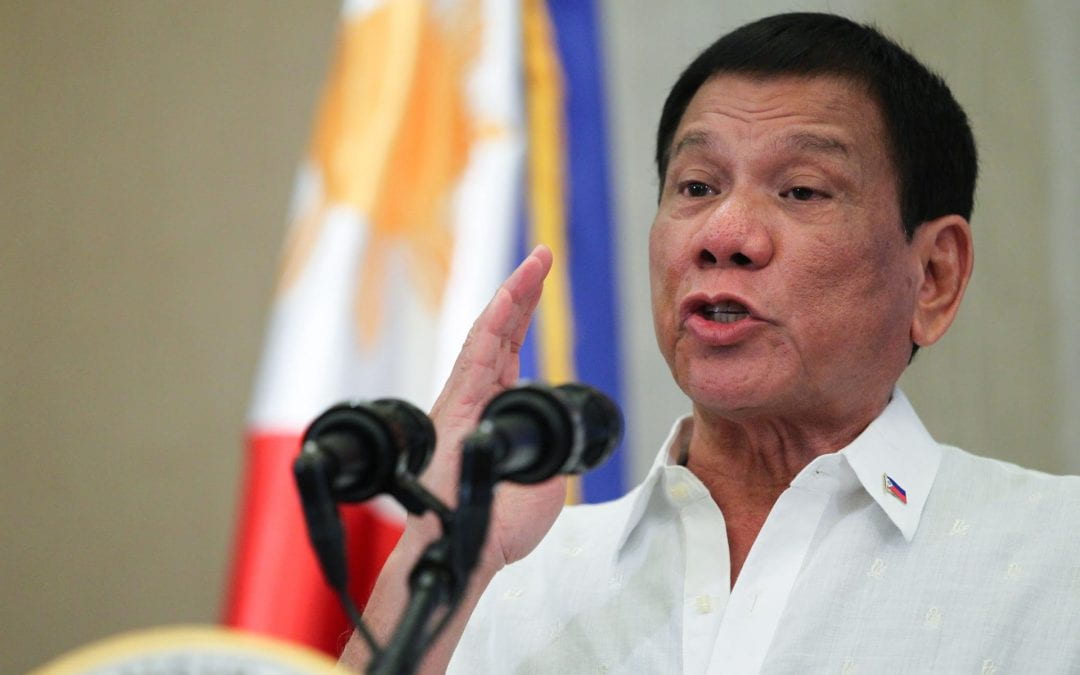By Ben Goldson
Duterte claims to be fighting crime. But it appears that unionists are being killed with virtual impunity in the Philippines.
In 1975, workers at the La Tondena brewery in Manila walked off the job, defying Ferdinand Marcos halfway through the two decades he spent as President of the Philippines. Having declared martial law just three years before, Marcos’ police state soon broke the strike. Business resumed but the disruption inspired workers across the Philippines to challenge the Marcos government during the lead up to his downfall in the “People Power Revolution” of 1986.
The next thirty years saw a succession of democratically elected Presidents: liberals, conservatives, Christian democrats and finally the outsider populist Rodrigo Duterte. The son of an official in the Nacionalista Party, which Marcos headed before forming the Kilusang Bagong Lipunan coalition, Duterte was nonetheless appointed Vice Mayor of Davao City soon after the People Power Revolution. As Mayor, Duterte cultivated an image as a tough on crime strongman, bringing this with him to the Presidency amidst concerns about his attitude towards human rights. Since he took office, authorities estimate more than 5,000 people have been killed by police. These numbers are disputed by rights groups, who have put the real figure as much as four times higher than the official record. Part of the disparity is due to a report by Amnesty International about ad hoc death squads that operate based on information which comes from individuals themselves involved in the drug trade. Duterte has so far rejected the various criticisms levelled against him, accusing detractors of seeking to undermine his administration, a potentially dangerous accusation in the current climate.
Alongside Duterte’s crackdowns, he has overseen an intensification of the historic conflict against the country’s Maoist insurgency. A product of the late 1960s, the war is being fought by the government against the National People’s Army of the Communist Party of the Philippines, which also established a broader National Democratic Front as a link to civil society. Having begun his Presidency negotiating with the NPA, Duterte has now suspended the talks, with the CPP and NPA declared terrorist organisations under the Philippines Human Security Act of 2007. This has opened up alleged supporters of the insurgents to prosecution, including rights groups, journalists and trade unionists, who have been subjected to arrest and general police harassment.
At the same time, other members of the labour movement are also being killed by unknown assassins. In a recent case, Leonides “Dennis” Sequeña was shot dead in Cavite while leaving a meeting with workers. A member of the radical Partido Manggagawa (“Labor [sic] Party”), the victim had been involved in organising workers in the Cavite Export Processing Zone, a free-trade area in which five workers were killed in a 2017 factory fire. By the estimation of the International Trade Union Confederation, Sequeña’s unsolved death brings the total number of unionists murdered under Duterte to 43.
Duterte claims to be fighting crime. But it appears that unionists are being killed with virtual impunity in the Philippines. Like journalists, which are also under attack in the Philippines, unionists can make enemies: employers, extortionists, fascists, even rivals in the labour movement or Maoist militants angered by a lack of support for the armed struggle.
The way in which Sequeña died—shot in public from the back of a motorcycle—mirrors previous tactics described in Amnesty International’s expose of state-sponsored vigilantism in Duterte’s drug crackdown. But further investigation is made difficult by the dearth of information available on the murdered 43, with the ITUC only naming Sequeña in their press release, making a broader picture more difficult to put together.
It wouldn’t be without precedent for a state to use organised crime to fight leftists. Established criminal syndicates have enjoyed a long history as a paramilitary wing of local power structures hamstrung by the constraints of the law. In nearby Indonesia, “preman” gangs were transformed into anti-Communist death squads during the 1960s, a phenomenon documented in Joshua Oppenheimer’s 2017 documentary, The Act of Killing. The Royal Laotian Army took over the country’s lucrative opium industry, with the alleged support of their contacts in the Central Intelligence Agency, according to Alfred W. McCoy. In his 1971 book, The Politics of Heroin in Southeast Asia, McCoy claimed that the CIA worked closely with drug syndicates around the world, from Laos to the island of Sicily, where “Mafia” clans had emerged amidst growing class conflict. Around a decade later, revelations of CIA assets involvement in the drug trade came to light with a wider scandal around the Nicaraguan “contra” rebels. The revelations shone light into the role of cocaine smuggling in the politics of America’s backyard, which brings together drug cartels, right-wing paramilitaries and the American intelligence services. Inside the United States itself, the practice of labour racketeering put street gangs at the forefront of the turmoil during the Great Depression. With employers paying for industrial peace, militancy was bad for business, with clashes between radicals and local gangsters in New York’s Garment District culminating in a 1932 raid on the headquarters of the Needle Trade Workers Industrial Union.
In the Philippines, the killings are taking place in a climate of official hostility to organised labour, with the perpetrators likely emboldened by the rhetoric coming out of the Presidential Palace. The spate of deaths represents one of the sharper edges of Duterte’s wider battle against his critics in civil society, a crusade which has drawn comparisons to Ferdinand Marcos, who was eventually toppled in part by the efforts of the labour movement. Given this history, an attack on the country’s unions could be part of an attempt to once again supress democracy in the Philippines.
Ben Goldson is a news and current affairs broadcaster at 95bFM radio in Auckland.
Disclaimer: The ideas expressed in this article reflect the author’s views and not necessarily the views of The Big Q.

